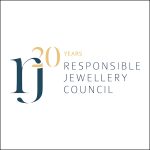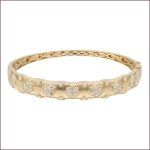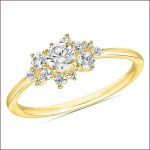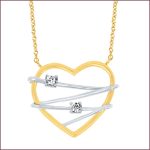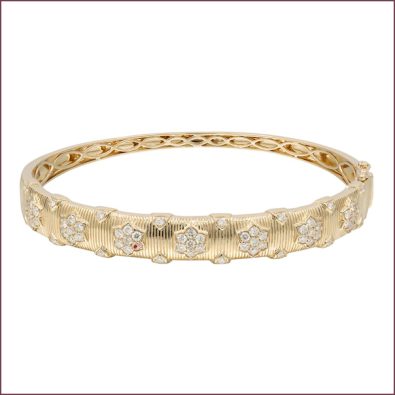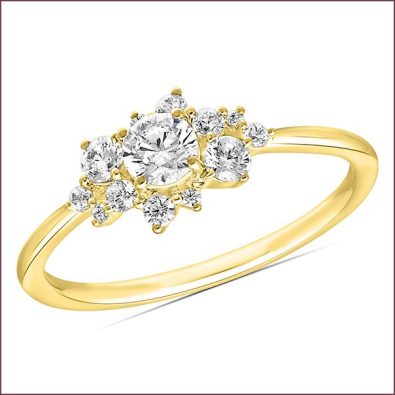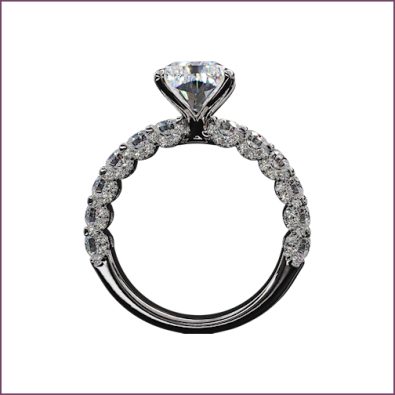There’s No Business Like the Wedding Business
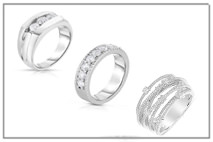 With some imagination and initiative, jewelers can expand the profitability of their wedding business. Yes, the wedding market has had its share of challenges, having never really recovered from the recession, as evident by the bankrupt bridal gown company Alfred Angelo and struggling David’s Bridal.
With some imagination and initiative, jewelers can expand the profitability of their wedding business. Yes, the wedding market has had its share of challenges, having never really recovered from the recession, as evident by the bankrupt bridal gown company Alfred Angelo and struggling David’s Bridal.
Young couples today are just not buying into marriage like they used to despite the fact that the millennial generation is the largest in history (92 million strong spanning 18 to 38 in age), cites Pam Danziger, president of Unity Marketing, Stevens, Pennsylvania. The marriage rate declined from 8.2 marriages per 1,000 in 2000 to 6.9 in 2016, finds the CDC/NCHS National Vital Statistics.
Millennials are getting married later in life, but Danziger cites a study from James Allen, a Signet Jewelers Limited online brand, that shows 30% of newly married couples delayed their wedding because of the average cost to put one on, exceeds $35,000 reports The Knot, and is a heavy financial burden. Not a priority, a Pew Research Center study finds over two-thirds of Millennials say society is just fine if people have priorities other than marriage and children.
As advocated by the Diamond Producers Association in its Rare is Real campaign, they sought out to reach Millennials with a message that connects diamond jewelry as the perfect symbol to celebrate life moments. With one in four couples discussing marriage more than two years before actually getting engaged, says The Knot, jewelers would benefit from identifying the many ways to celebrate their journey together with gifts of jewelry, says Sadhna Venkat for MWI Eloquence, New York.
While there is a focus on first time Millennial couples, there are other opportunities to expand the wedding market. 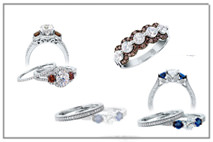 Make a special appeal to encore brides and grooms. The U.S. National Center for Health Statistics states that more than four in 10 weddings involve an encore marriage for the bride, groom or both, and since marriage equality became the law of the land in 2015, same-sex couples are navigating their own takes on longstanding traditions and are eager to work with pros that are equality minded, finds The Knot’s LGBTQ Weddings Study 2017 with Q.Digital. They’re seeking out wedding vendors that openly show support for same-sex marriage through language or photos on their websites, marketing or The Knot Marketplace profiles.
Make a special appeal to encore brides and grooms. The U.S. National Center for Health Statistics states that more than four in 10 weddings involve an encore marriage for the bride, groom or both, and since marriage equality became the law of the land in 2015, same-sex couples are navigating their own takes on longstanding traditions and are eager to work with pros that are equality minded, finds The Knot’s LGBTQ Weddings Study 2017 with Q.Digital. They’re seeking out wedding vendors that openly show support for same-sex marriage through language or photos on their websites, marketing or The Knot Marketplace profiles.
It’s important for couples to see themselves reflected in jewelers’ marketing and communication. “Typical ads hold couples to hetero-normative standards; ads to attract men have been lacking, and not just to gay men, and current advertising has a limited view on how to solicit women, buyers,” says Matthew Perosi-Doughty with the Jewelers Equality Alliance. While Tiffany came out with its first gay engagement ad in January 2015, and Zales ran one in 2016 to some blowback from One Million Moms accusing it of “normalizing sin”, Perosi-Doughty emphasizes that advertising creates influence and inclusive ads educate. So if inclusiveness is what you support, let it be known.
Putting People Over Product
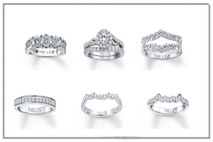 Rebecca Foerster, executive vice president of strategic planning and marketing, Leo Schachter Diamonds, New York advocates jewelers shift from product to people. “It’s about positioning diamonds and jewelry as the ideal symbol of what is rare and precious. What doesn’t work is a hard sell and self-endorsement.” She encourages jewelers to create beautiful displays, visual storyboards, and short video clips that highlight personal reasons for gifting rather than marketed ones.
Rebecca Foerster, executive vice president of strategic planning and marketing, Leo Schachter Diamonds, New York advocates jewelers shift from product to people. “It’s about positioning diamonds and jewelry as the ideal symbol of what is rare and precious. What doesn’t work is a hard sell and self-endorsement.” She encourages jewelers to create beautiful displays, visual storyboards, and short video clips that highlight personal reasons for gifting rather than marketed ones.
Merchandise products in a lifestyle way, advises Jonathan Goodman Cohen, president of IB Goodman, Newport, Kentucky. “Visual cues create an experience.” He advocates jewelers use their websites and social media to engage the market by testing new products, sharing style trends, offering gift ideas, and telling stories.
Customization rules
Regardless of sexual orientation or whether it’s the first or fourth time marrying, couples want a personalized 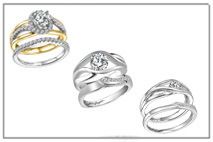 experience. The Knot research finds that personalization has made its way into every aspect of the wedding. “I’ve not seen the trend for customization as strong as it is today,” says Russ Whitehouse, director of operations for the Stuttgart, Arkansas manufacturer Wilkerson and bridal brand John Bagley. “Jewelers have to be able to alter styles or they are stuck in the mud.”
experience. The Knot research finds that personalization has made its way into every aspect of the wedding. “I’ve not seen the trend for customization as strong as it is today,” says Russ Whitehouse, director of operations for the Stuttgart, Arkansas manufacturer Wilkerson and bridal brand John Bagley. “Jewelers have to be able to alter styles or they are stuck in the mud.”
Trending styles favor fancy shapes. “Using fancy shapes is a great way of taking a simple silhouette and making it unique,” says Foerster. A blip on the radar at 1% of engagement ring purchases in 2011, The Knot found that in 2017 7% of couples chose an oval cut. Pear, marquise and cushion cuts are also popular.
Other trends are for two-tone styles, color stones (brown and champagne diamonds, sapphire and morganite), and a greater focus on bands. At least 50% of engagement rings are sold without the matching band, says Whitehouse, who also notes that couples don’t match their bands either. Venkat hails eternity bands a bestseller, noting that women are mixing metals, gems, and styles of rings fueled by the stacking trend.
Go Beyond Engagement and Wedding Rings
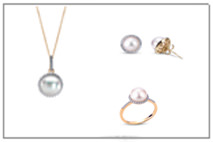 “There’s more opportunity for jewelers beyond engagement and wedding rings to help their customers as wedding consultants,” says Kathy Grenier, vice president of business development, Imperial Pearl, Providence, Rhode Island. “Plant the seeds of the meaningful ways you can help couples celebrate the occasion.”
“There’s more opportunity for jewelers beyond engagement and wedding rings to help their customers as wedding consultants,” says Kathy Grenier, vice president of business development, Imperial Pearl, Providence, Rhode Island. “Plant the seeds of the meaningful ways you can help couples celebrate the occasion.”
The Knot finds six in 10 brides give gifts to their bridesmaids with jewelry most popular. Pearls remain a leading choice, but other popular gifts include initials, birthstones, and message jewelry. Eight out of 10 brides buy jewelry to wear on their wedding day (58% wear fine jewelry), with earrings, hair accessories, and bracelets favorites. One out of three grooms accessorizes, with cufflinks No. 1.
“Items that can be engraved are bestsellers,” says Cohen, who cites accessorizes that can be personalized, retailing for $35 to $300, as key gifts. Expect to see more silver jewelry promoted in the wedding category, with increased marketing by the Silver Promotion Service. Grenier says stagecraft is critical in displays that help customers identify product assortments appropriate to gift and wear for the occasion.
